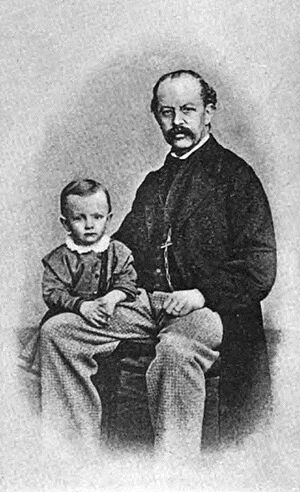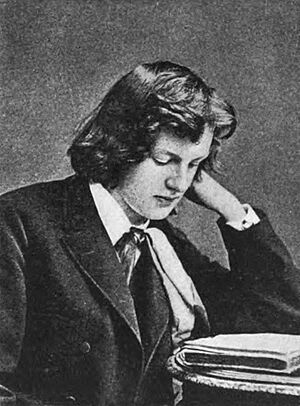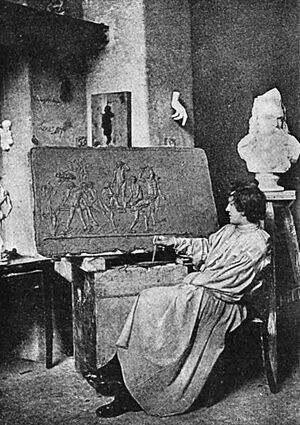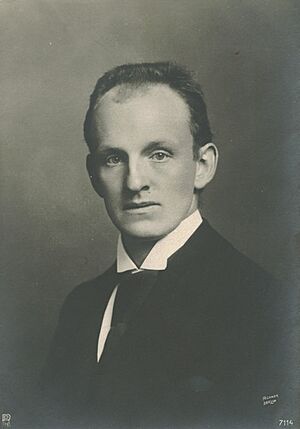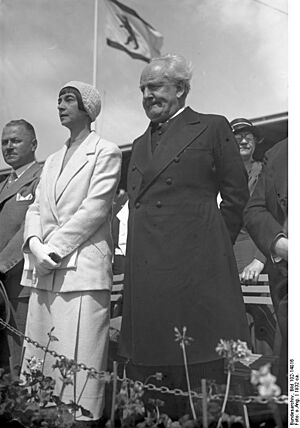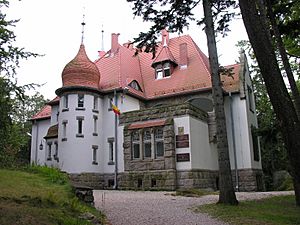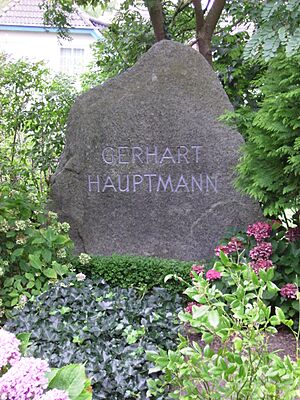Gerhart Hauptmann facts for kids
Quick facts for kids
Gerhart Hauptmann
|
|
|---|---|
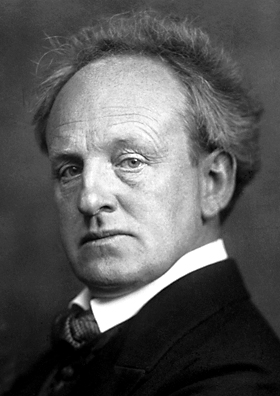 |
|
| Born | Gerhart Johann Robert Hauptmann 15 November 1862 Obersalzbrunn, Silesia, Kingdom of Prussia (now Szczawno-Zdrój, Poland) |
| Died | 6 June 1946 (aged 83) Agnieszków, Poland |
| Occupation | Dramatist |
| Nationality | German |
| Literary movement | Naturalism |
| Notable works | The Weavers, The Rats |
| Notable awards |
|
| Signature | |
 |
|
Gerhart Johann Robert Hauptmann (born November 15, 1862 – died June 6, 1946) was an important German playwright and novelist. He is known for helping to start the naturalism movement in literature. Naturalism is a style that shows life as it really is, often focusing on everyday people and their struggles. Gerhart Hauptmann won the Nobel Prize in Literature in 1912 for his amazing plays and stories.
Contents
Life Story
Early Life and School Days
Gerhart Hauptmann was born in 1862 in a place called Obersalzbrunn, which is now Szczawno-Zdrój in Poland. His parents, Robert and Marie Hauptmann, ran a hotel. As a child, Gerhart sometimes had a reputation for not always telling the full truth. His older brother was Carl Hauptmann.
He started village school in 1868. In 1874, he went to a school in Breslau, a city nearby. Gerhart found it hard to get used to city life. He struggled with the strict teachers and felt that noble students were treated better. He often missed classes because he was sick or just didn't like school. This meant he had to repeat his first year. But he did learn to enjoy Breslau because he could visit the theater.
In 1878, Hauptmann left school to learn farming on his uncle's farm. But he wasn't strong enough for the hard work. He also got a serious lung illness that bothered him for almost two years.
Becoming a Sculptor and Student Life
After not passing an army officer exam, Hauptmann went to a sculpture school in Breslau in 1880. There, he met Josef Block, who became a close friend for life. He was briefly kicked out of school for "poor behavior" but was allowed back in. He left the school in 1882.
For his brother's wedding, Gerhart wrote a short play called Liebesfrühling. At the wedding, he met Marie Thienemann, the bride's sister. They secretly got engaged, and Marie started helping him with money. This allowed him to study philosophy and literary history at the University of Jena, but he soon left.
Marie then paid for him to travel around the Mediterranean Sea with his brother Carl. In Rome, he tried to become a sculptor, but it didn't go well. He also tried to fit in with other Germans living in Rome, but that didn't work either. His big clay sculpture of a German warrior even fell apart! Hauptmann returned to Germany feeling disappointed. He briefly studied at an art academy in Dresden before going to the University of Berlin to study history. However, he was more interested in the theater than his studies. In 1891, he moved to a town called Schreiberhau in Silesia.
Marriage and First Steps as a Writer
Gerhart Hauptmann married Marie Thienemann on May 5, 1885. They went on their honeymoon to an island called Hiddensee, which became one of Hauptmann's favorite places. Because the city air was bad for Gerhart's lungs, they lived in a town called Erkner for the first four years. Their three sons were born there. In 1889, they moved to Berlin. There, he joined a literary club called "Durch," where writers who believed in naturalism met.
During this time, he started writing seriously. His short novel Bahnwärter Thiel was published in 1888. His first play, Before Sunrise, was performed in 1889. This play helped start the naturalistic movement in modern German literature. He then wrote other plays like The Reconciliation (1890), Lonely People (1891), and The Weavers (1892). The Weavers is a powerful play about a workers' uprising in 1844, and it's one of his most famous works outside Germany. He also wrote comedies, such as Colleague Crampton (1891) and The Beaver Coat (1893).
In 1893, his marriage with Marie began to have problems. Marie moved to the United States with their sons. After several years apart, they divorced in 1904.
Fame and World War I
From 1901, Hauptmann lived with Margarete Marschalk. They married in September 1904. This marriage lasted until his death.
In 1910, Hauptmann's first full-length novel, The Fool in Christ, Emanuel Quint, was published. It was about a traveling preacher. His 1912 novel, Atlantis, was even made into a silent film. Interestingly, the novel was written a month before the famous Titanic disaster. The film came out less than a year after the Titanic sank. Both the book and the movie were about a romance on a sinking ocean liner. Because of how similar it was to the real disaster, the film was banned in Norway.
Around the early 1900s, Hauptmann started getting official awards. He received honorary doctorates from universities like Oxford and Leipzig. In 1912, he won the Nobel Prize for Literature. The prize was given to him for his "fruitful, varied and outstanding production in the realm of dramatic art."
However, not everyone liked Hauptmann's work. The German Emperor, Kaiser Wilhelm II, didn't like his "social democratic" ideas. In 1913, a play of Hauptmann's was even canceled because it showed the anniversary of Germany's freedom from Napoleon in a peaceful way, not a patriotic one. But the next year, Hauptmann supported Germany's entry into World War I.
He signed a statement called the Manifesto of the Ninety-Three, which was signed by many German thinkers and artists who supported Germany's military actions at the start of the war. He also wrote poems supporting the war. In 1915, the Emperor gave him an award. After Germany lost the war and the monarchy ended, Hauptmann went to a peaceful community in Switzerland. Later, he wrote a poem called Till Eulenspiegel, which remembered a pacifist (someone who is against war) who was killed.
Germany's Representative Poet
In 1918, Hauptmann joined other German thinkers in supporting the new Republic (Germany's government after the war). He was even considered for important political jobs, but he turned them down.
He became the first person to receive the Adlerschild des Deutschen Reiches, an award for great achievements in art or academics. Even though fewer people were buying his books, he was still very popular. People in other countries saw him as the most important German writer. In 1932, he went on a lecture tour in the United States and received another honorary doctorate. He also won the Goethe Prize.
For his 70th birthday, he received many honors and celebrations. His plays were performed with famous actors. From 1926 to 1943, Hauptmann spent his summers with his family on the island of Hiddensee.
During the Nazi Era
When the Nazis came to power in Germany in 1933, Hauptmann signed a loyalty oath. He saw himself as an artist who was above politics. Even though many other writers left Germany, the Nazis wanted to keep Hauptmann in the country because he was so well-known.
However, the Nazi government still watched his work. They even banned a new edition of one of his stories because it had a Black character. They claimed it was due to a paper shortage. Film versions of his plays were also censored. But for his 80th birthday in 1942, the Nazis honored him with celebrations and performances. He was given the first copy of his 17-volume collected works.
Hauptmann lived through the end of World War II at his house, Wiesenstein. In 1944, he published a series of four plays he had been working on for years. His name was also put on a special list of "God-gifted" artists who were considered very important to German culture and didn't have to fight in the war. He was one of the six most important writers on this list.
During the terrible bombing of Dresden, Hauptmann was in a hospital there. He later said, "Whoever had forgotten how to cry learned again at the destruction of Dresden."
After the war, the area where Hauptmann lived became part of Poland. He was allowed to stay for a while, but in April 1946, he was told he would have to leave. He became very ill before he could be moved.
Death
Gerhart Hauptmann died on June 6, 1946, from a lung illness. His last words were reportedly, "Am I still in my house?" Even though he wanted to be buried at his home, he was not.
An hour after he died, local police gathered outside his window, making loud noises.
Funeral
A funeral service was held for Hauptmann in Stralsund, near his summer home on Hiddensee island. Important officials and writers spoke at the service.
On July 28, 52 days after he died, Gerhart Hauptmann was buried before sunrise in the cemetery on Hiddensee. His wife, Margarete, mixed a small bag of earth from his home region in Silesia with the sand from the Baltic coast where he was buried. In 1951, a granite stone was placed on his grave. It only has his name on it, just as he wished. In 1983, his wife Margarete's remains were moved to be buried next to him.
His Works
Influences on His Writing
Hauptmann first learned about the naturalist movement through a group called "Durch" in 1885. This group was very important to his writing. They discussed ideas about idealism, realism, and naturalism. Hauptmann gave a talk about a forgotten writer named Georg Büchner, which showed his interest in naturalism.
In the late 1880s, he faced a movement against socialism. Hauptmann was even called to court because he followed the ideas of a French communist. He went to Switzerland to avoid trouble. There, he met a psychiatrist and a preacher whose ideas influenced his play Before Sunrise. Hauptmann's early ideas about a perfect community were also shaped by meeting a poet named Gusto Gräser.
Naturalism in His Plays
Hauptmann started writing naturalistic works in Switzerland. He sent his first naturalistic story, Bahnwärter Thiel, to a critic in Munich. His 1889 play Before Sunrise caused a big stir in German theater.
While Before Sunrise was a very important play, it was Hauptmann's most famous play, The Weavers, that brought him worldwide fame. This play showed the struggles of workers and is considered the peak of his naturalistic writing. With the help of a director named Otto Brahm, Hauptmann played a key role in bringing naturalistic plays to German stages. His plays helped naturalism become widely known and have a big impact on society.
See also
 In Spanish: Gerhart Hauptmann para niños
In Spanish: Gerhart Hauptmann para niños
 | Georgia Louise Harris Brown |
 | Julian Abele |
 | Norma Merrick Sklarek |
 | William Sidney Pittman |


